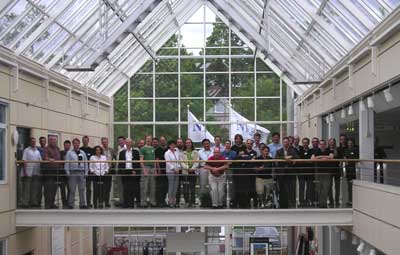- The workshop is over, and it was a big success. During the next few days, slides, photos and other material related to the workshop will be uploaded to this site.
 All the slides for the talks presented at the workshop are now available. See the Schedule / Slides section for downloads / links. All the slides for the talks presented at the workshop are now available. See the Schedule / Slides section for downloads / links.
- Photos from the workshop are also online. (Thanks to Manuel Odenthal and Hans Hübner.)

Photo by Koenraad de Smedt
Lisp has a tradition of providing a fruitful basis for language design experiments for many decades. The structure of Lisp, including Common Lisp and Scheme as its major dialects of today, makes it easy to extend the language or even to implement entirely new dialects without starting from scratch. Common Lisp, with the Common Lisp Object System (CLOS), was the first object-oriented programming language to receive an ANSI standard at the beginning of the 1990’s. It is, arguably, the most complete and advanced object system of any programming language, and has influenced many other object-oriented programming languages that were to follow.
Despite the fact that Lisp languages have somewhat disappeared from the radar of popular computer science, Common Lisp and Scheme are still alive and have just started to gain momentum again. Since 2000, annual Scheme workshops have been organized in Montreal, Florence, Pittsburgh and Boston. Since 2002, annual International Lisp Conferences have been organized in San Francisco and New York. In last year’s ECOOP Workshop on Object-Oriented Language Engineering for the Post-Java Era, Lisp- and Scheme-based language extensions have played a prominent role. Indeed, that workshop has created a spontaneous interest in a Lisp BOF with over 10 participants (out of 40 attendants of the Post-Java workshop).
The growing interest in Lisp languages is most probably due to the fact that many current trends in the field of software engineering and object-oriented technology are heavily influenced by notions that are prevalent in Lisp and Scheme – most prominently a way to treat programs as data and the resulting facilities for metaprogramming. Current trends like Aspect-Oriented Programming, Domain-Oriented Programming, Model-Driven Architectures, Generative Programming, and so on, make heavy use of such facilities at the back stages.
This one-day workshop will address the question what role Lisp-based languages can play in the near future to further the state of art in those and related areas. We want to solicit papers that discuss the opportunities Lisp provides to capture and enhance the possibilities in software engineering. Instead of using Lisp for Artificial Intelligence, as has successfully been done in the past, we rather want to explore the usefulness of Lisp with regard to software technology. We also want to promote lively discussion between researchers proposing new approaches and practitioners reporting on their experience with the strengths and limitations of current Lisp technologies.

Supported by ALU
|